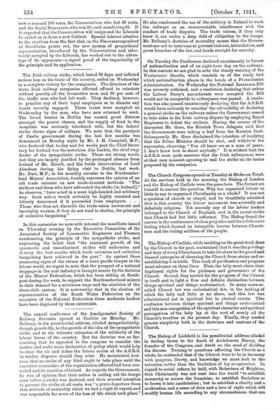The Irish railway strike, which lasted 1S days and inflicted
serious loss on the trade of the country, ended on Wednesday in a complete victory for the companies. The directors of the three Irish railway companies affected offered to reinstate without penalty all the locomotive men and 90 per cent. of the traffic men who had left work. They declined, however, to penalize any of their loyal employees or to dismiss any bands recently engaged. These terms were accepted on Wednesday by the men, who have now returned to work. The bread famine in Dublin has caused great distress amongst the poorer classes, and the supply of food to the hospitals was seriously interfered with, but the bakers' strike shows signs of collapse. We note that the paralysis of Castle government during the last few months was denounced on Monday night by Mr. J. H. Campbell, M.P., who declared that to-day and for weeks past the Chief Secre- tary for Ireland was the notorious Jim Larkin, the chief ring- leader of the sympathetic strike. These are strong words, but they are largely justified by the prolonged absence from Ireland of Mr. Birrell, and the futile intervention of Lord Aberdeen during his flying visit to Dublin last week. Mr. Burt, M.P., in his monthly circular to the Northumber- land Miners' Association, frankly expresses the opinion of an old trade unionist on new trade-unionist methods. "The strikers and those who have advocated the strike [in Ireland]," he observes, "have acted in a most high-handed and arbitrary way. Such action would certainly be highly resented and bitterly denounced if it proceeded from employers. . . . Those who thus act discredit the trade-union movement and inevitably weaken, if they do not tend to shatter, the principle of collective bargaining."






























































 Previous page
Previous page